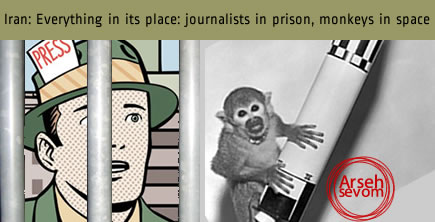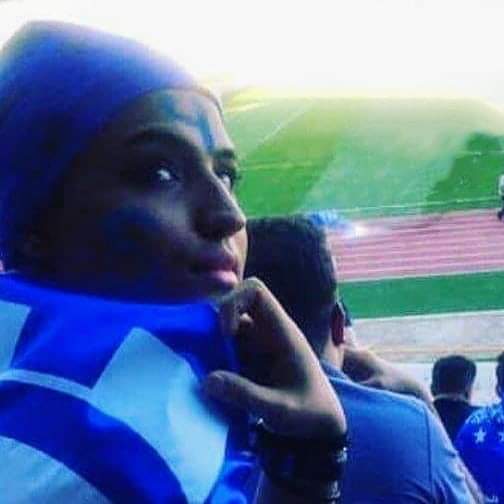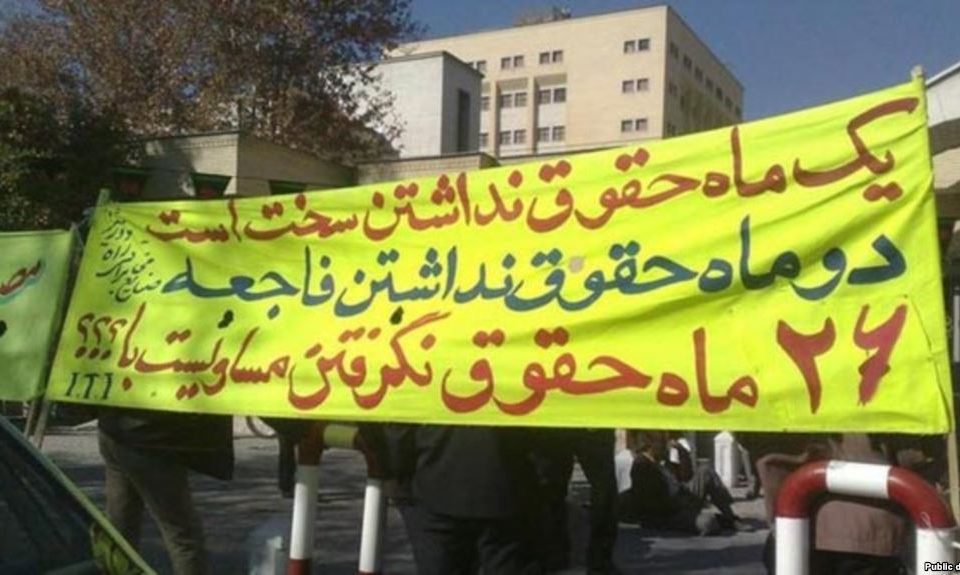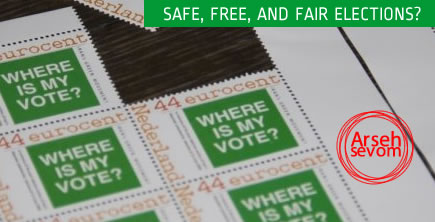
Iran: Say What? Was that Free Elections?
January 29, 2013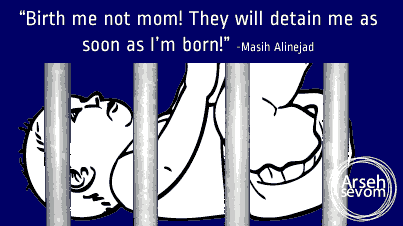
Iran: No News is Bad News, Crackdown on Journalists
February 4, 2013Arseh Sevom —Everything has its place in Iran: monkeys in space and journalists in prison. And, oh what a prison! After prisoners complain of their conditions, parliamentarians visit Evin, calling it a “hotel.” Stoning makes a comeback — at least in print. The surveillance of Iran’s cafes is revealed when Cafe Prague closes its doors in protest.
Iranian Journalists Under Arrest

On January 27, Iranian authorities arrested a number of journalists accused of cooperation with foreign-based, Persian-language media organizations. The next presidential election is close and the crackdown on reformist media can be seen as an attempt to prevent a repeat of the protests seen during the Green movement uprising in 2009. Tehran Bureau reports that many other reformist journalists fear they may be next. After the raid by Iranian Security Officials, some reformist newspapers arranged a protest against the crackdown. Shargh daily [fa] published a blank column on its cover page in objection to the arrest of one of its staff members, Pouria Alami, and explained that “it will not be printed until further notice.” The Bahar daily [fa] was another newspaper to protest against the arrest of journalists.
As Radio Zamaneh [fa] reports that Iranian authorities blocked the news websites Tabnak and Baztab Emrouz along with the historical website Tarikh Irani (Iranian History). The Mezrab Blog has a good overview of the situation, writing:
“The minister of Culture and Guidance (translated from double-speak that means ministry of censorship) has declared they are not arrested for journalistic work but for working for foreign anti-revolutionary media that spread, which means they are, if convicted, traitors and will receive harsh punishment.”
It is quite likely that more similar stories are on the way.
Guardian Council Brings Stoning Back
Stoning has long been a controversial punishment in Iran’s legal system. The new Islamic Penal Law that was approved in the Parliament’s Judicial Commission tried to implicitly exclude stoning from the law. As Justice for Iran explained at the time, while the new bill did not proscribe stoning as a punishment, it gave judges free reign to cite religious interpretations of the law, which allowed them to continue using stoning and other harsh punishments. Implicit approval was not enough for the Guardian Council it seems. Iran Emrouz [fa] reports that they have demanded that stoning once again be explicitly allowed. The council is so determined in its position that does not agree even with excluding the term “stoning” from the law. As Fars News Agency [fa] reports, the Guardian Council brought 50 different objections to the new law including the addition of stoning. It seems that the Council does not intend to show any mercy.
On Monday January 22th, four members of Security Committee of the parliament’s Foreign Policy and National Security Commission visited Evin Prison in Tehran. As BBC News [en] reports, one of them, Safar Naeimi, said after the visit: “From now on, I will call it Hotel Evin, rather than Evin Prison.” In recent months, many prisoners who were arrested after the post-election protests of 2009 have complained about their conditions in the prison. It seems that the representatives’ visit was an attempt to defuse such complaints.
However, the report of the representatives was followed by serious criticisms. Iran Green Voice [fa] reports that Fakhr-ol Sadat Mohtashamipour, whose husband Mostafa Tajzadeh is imprisoned in Evin, asked members of the Commission to either report honestly or remain silent on the issue. She suggested that they go live in Evin prison if they consider it as a hotel.
Coffee Shops under the Ever-Watchful Eye
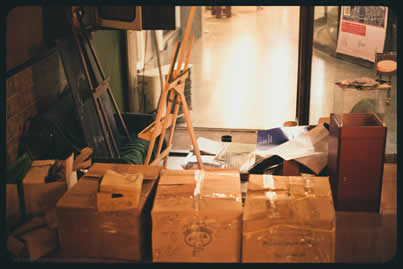
Packed up and ready to leave, from the photo album The Last Days of Cafe Prague
Coffee shops have a unique position in Iranian society, especially among the youth. Some coffee shops have been intellectual hangouts for many Iranians. Tehran Bureau reports that Iran’s morality police have recently expanded their political surveillance by ordering coffee shop owners to install cameras on their premises and turn over the recordings on demand.
Some coffee shops accepted the terms. Some others, however, showed more courage. The practice became public when Café Prague, one of the most popular coffee shops in Tehran, closed down last week after its owners refused to install a video system. The owners posted on their Facebook page [fa]:
“As much as it pains us and as much as we will miss our friends and all of you who stood by our side in the past four years, we take comfort in knowing that we at least didn’t let Big Brother’s glass eyes scan and record our every step, minute and memory from dawn till dusk”.
You can see a photo collection of the last day of Café Prague here.

Taken from a video posted by PressTV
Fars News [fa] reported that Iran has successfully launched a monkey in space in their rocket named Pishgam (Pioneer). The rocket traveled 75 miles (120 km) above the earth. Officials said that the Iranian-built space capsule returned intact and the monkey was still alive and safe after its sub-orbital experience.
In the past, there have been criticisms about the mistreatment of animals in space during the competition between the US and Soviet Union. As The Guardian reports, the animals rights group Peta said it was appalled by the photographs:
“Iran is repeating the wasteful and cruel mistakes that marked the darkest days of the space race.”
The monkey looks upset or even terrified in some of the photos, probably like some neighboring countries. After all, it was a big step for Iran; a fact that cannot be easily denied.


